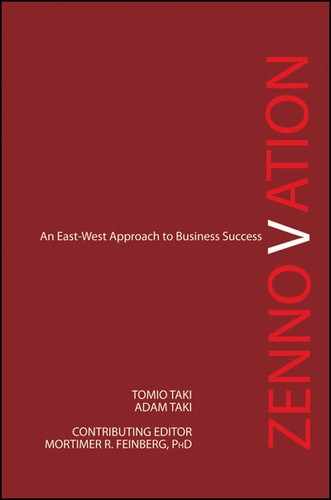Preface
Former editor-in-chief of Harper’s Bazaar Japan, Misao Itoh, wrote a book about me called Manager: Tomio Taki, the Man who Launched Donna Karan. It was a fantastic text, and I was honored that such a celebrated writer was interested in devoting so much of her own time to telling my story.
After its publication, however, I felt a bit unsettled. The book was great, but it was written in Japanese for a Japanese readership. Although people in Japan may know of my family company, the most extensive international brands that I’ve founded were launched in the United States. In a way, publishing a book in Japanese for only a Japanese readership excludes Americans and other Anglophones from knowing the history behind the brands and labels I helped create.
A longtime friend and industrial psychologist, Dr. Mortimer Feinberg, insisted I address this concern. Since I am still quite busy, it would have been difficult for me to put pen to paper in a timely manner; therefore, I met with a few capable ghostwriters. The first of these had been a sports journalist, and although he made certain points of my story sound more exciting than I thought they were, he didn’t really capture my voice. The second ghostwriter seemed better able to understand how to write a book about entrepreneurship in a straightforward and nondogmatic way. However, I still felt that there was something missing after receiving the draft. Although she understood the concepts founding my train-of-thought and decision-making strategies, the text read a bit on the bare-bones side of a book. The manuscript lacked some cultural nuance and sensitivity.
Although I was not sure what to do, I was interested in hearing what others had to say. I sent the manuscript out to my immediate family to hear their positions. At the time, my son had been a master’s student at NYU in the English Department, so I thought he might offer some meaningful insight. I have learned that he tends to be quite critical, which can be immensely helpful despite the difficulties it may present. So after I sent him a draft, I hoped he would read it and give some helpful suggestions so I could go back to the ghostwriter and come to a second draft.
Instead, Adam wound up writing a tome criticizing the original draft. He sent me an e-mail that I started reading; however, there were so many strong positions that I simply gave up. I suppose that’s what I get for sending it to someone who has dedicated the lion’s share of his master’s thesis to etymology and semiotics. He was very opinionated and strong-minded, so I returned an e-mail to him asking him to write the draft.
I knew Adam still had a semester or so to finish his master’s, so most of the writing had to be done after he’d finished at NYU; however, he began meeting with Mort weekly to go over the broad strokes and devise an outline. Adam had originally suggested revising the current draft and merely adding new anecdotes and supporting evidence. Adam completed this task alongside his master’s thesis, but he was unhappy with the result. He wanted more focus and direction. I wanted my story to be told but recognized that there were so many fragments that it would be difficult to thread an even, straightforward narrative. Not to say that Don DeLillo’s work is less credible because of its fragmentary nature, but it wouldn’t make sense for this kind of book in need of a clear beginning, middle, and end.
The summer after completing his coursework, Adam traveled to Japan, South Korea, and Hong Kong to meet with some of my friends and colleagues. He began to parse together my story as he learned about me from other people. For some reason, I have garnered a reputation for failing to disclose personal information—partially a result of habit and partially probably the trace of my upbringing steeped in Japanese culture. I differentiate the two because in my younger years, I was president of my family’s 250-year-old textile, fashion, manufacturing, and wholesaling business. As a result, I tended to keep information relatively close to my chest. I think my son learned a lot, as this book covers a lot of information in only so many pages.
After his research, Adam sat down to write my book in English. He chose to focus first on my youth to offer perspective on my upbringing, then on to the most formative and complex experiences of my entrepreneurial career. The book is therefore split into two parts. The first consists mostly of my story heading Takihyo Company Ltd. in Japan through treacherous economic conditions that rival those of the recent financial recession. The second part consists of my entrepreneurial activities in the United States, including building the brands of the Anne Klein Company. I hope you will enjoy reading about some of the problems I faced and the decision-making process I underwent to solve them.
—Tomio Taki
